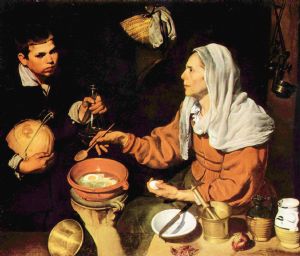My
mother-in-law likes to tell my children the Tuscan joke about the cat that
waited for the mouse to emerge from its hole in the wall. For three days, the
cat sat outside the mouse’s home, waiting, waiting, waiting. When eventually
the cat barked ‘bow wow,’ the mouse ran out and the cat caught it. As the cat
ate the mouse, the mouse said ‘I didn’t know you spoke dog. You could have told
me you spoke two languages.’
Nonna says the joke reminds her of her two bilingual grandchildren. It’s typical,
too, of my Tuscan mother-in-law to use humor to gloss over a subject that has
often caused her pain. Tuscans do that: they tease and tell funny stories about
difficult issues till the problem is so out in the open it’s no longer a
sensitive subject. There’s no denying that nonna’s
only grandchildren’s journey towards two languages has not been easy for her.
I
follow the experts’ advice on raising bilingual
children-one-parent-one-language-which means I speak only English to our kids,
and my husband speaks only Italian. Along the way though, nonna has been left out. She doesn’t speak English, so when she’s visiting us from
her home in the mountains of Casentino in eastern Tuscany, she finds herself
isolated from my children’s world. They chat between themselves, gossip with
their friends, talk with my monolingual friends, all in English. Of course nonna feels marginalized.
It
wasn’t always this way. At first, my children spoke only Italian, and nonna,
widowed and dedicated to her only son’s young family, was in her element. She
spoke to the children in her own Casentinese dialect. Nenne for drink, cecce for
sit down and citta for young girl. She spoke to them in that special
Italian baby language that nonne seem to specialize in. Pappa for their food, nanna for nap and bua for a scratch or a bump.
But
as the children have become older and their English more fluent, they now tend
to speak only English at home. Babbo is often at work, so speaking in Italian is reserved for when he comes home or
when we go out. During her visits, this leaves nonna in the unenviable situation of being cut off from her grandchildren’s everyday
chatter.
Understandably
she was angry and let her disapproval be known. Or she joked that the children
didn’t know how to speak Italian. The kids were not intentionally leaving her
out, English is the language of their home and they just kept forgetting to
switch when nonna was there. In any case, she had good reason to feel
upset. So I developed a system to remind the children to speak Italian when
grandma visits. I make a talking gesture with my fingers, kind of like a shadow
puppet in the shape of a dog barking.
The
sign system works. The kids change language in mid-sentence and nonna is happy, no longer feeling cut-off from her grandchildren’s accounts of their
days at school and casually spoken thoughts. She’s never asked about the barking
hand gesture. For her, it’s another piece in the puzzle that is the world of
English.






